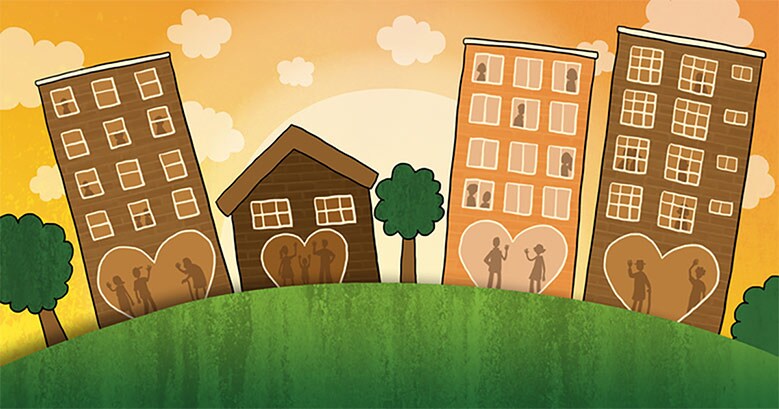
By now, the entire world has been rocked by the effects of the coronavirus crisis. This isn’t easy on anyone, no matter who you are or where you live.
But for refugees — that is, anyone who’s had to leave their home to search for safety, no matter their official status — the stakes are even higher. Right now, there are more than 70 million forcibly displaced people in the world. As newcomers seeking a safe new place to call home, refugees’ support systems are already frayed, and they don’t have the same legal or social safety nets in place. A pandemic just makes everything harder.
Ben & Jerry’s stands in solidarity with refugees. They’re our neighbours, our friends, and our family. And they’re facing some pretty substantial challenges right now.
-
1. Crowded Housing and Unsanitary Living Conditions
If you’re a refugee living through a pandemic, that may mean living in very close quarters with others seeking asylum, being forced to share rooms with symptomatic strangers, or even sleeping rough on city streets. We’re all trying to stay 2 metres apart right now, but for people living in densely populated refugee camps, that’s simply not possible.
-
2. Limited Access to Healthcare or Fear of Accessing it!
Because many forcibly displaced people are still in the process of seeking asylum, they’re often hesitant to seek out medical help for fear of landing in immigration detention. And some refugees face additional barriers to healthcare, such as transportation, lack of information, money, language, or fear of “hostile environment” policies.
-
3. Feeling Far from Loved Ones
Forcibly displaced people don’t choose to leave their homes. They’re forced to. And they usually can’t take all of the people they love with them. Social isolation and loneliness is affecting people worldwide. But imagine what it would feel like to live through this in a country that’s you're new to, where you might not speak the language, have a home WiFi connection, or even have the resources to top up your phone to call your family.
-
4. Government Delays
A person seeking asylum is forced to wait until the government reviews their case — but most governments have either suspended or delayed the processing of asylum claims and statelessness applications. The longer the delay, the more desperate the situation becomes — and the longer the backlog will be after operations resume.
How This Plays Out in Sweden
Here in Sweden, the government calls the shots – which means it also has the power to improve refugees lives. As we’ve seen the economic consequences of this pandemic, industries coming to a halt, for people with temporary residence the loss of job opportunities and income can result in losing the opportunity to renew their residence permit. NGO’s around the country has alarmed the challenges newcomers are facing right now and have been calling on the government to take action.
As we've seen the government make swift changes in order to support certain sections of our society, we want the same action to be taken in support some of the most marginalized communities.
Cone Together and Stand with Refugeees
COVID-19 has proved that we’re all in this together. If one person gets sick, we’re all at risk of getting sick — but if we all work together, then we can contain the spread of this virus. There are bright spots, and standing arm-in-[virtual] arm to help our new friends and neighbours will do nothing but make them brighter. Stand with us.


